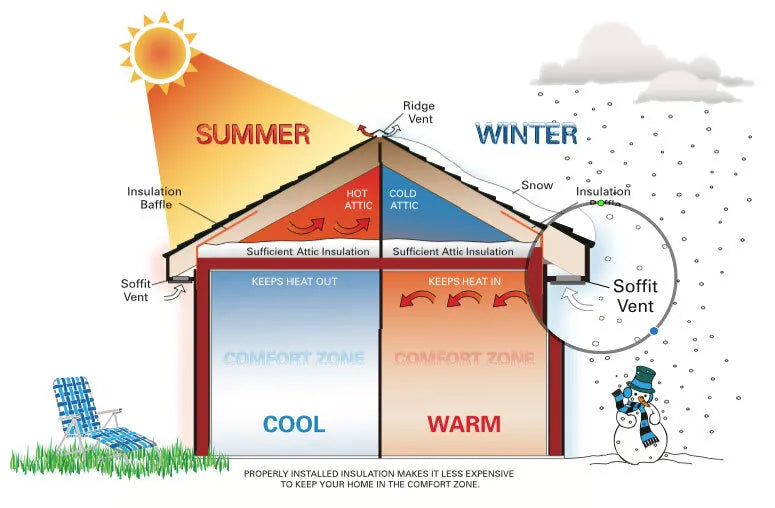Spray foam insulation is widely used because it remarkably reduces heating and cooling costs, making homes more energy-efficient. Its ability to create a seamless barrier against air infiltration and provide superior insulation makes it popular among homeowners.
Experts say spray foam insulation can reduce heating and cooling costs by 10-15% in modern homes. Also, homes built before 1990 with block walls can expect a 15-30% decrease in energy costs if spray foam insulation is installed. So, overall, spray foam insulation can save you around 50% or more in energy.
Today, we’ll explore what factors contribute to spray foam insulation's energy-saving potential. Plus, we'll explain why our Vega Bond insulating spray foam is the most energy-efficient option. So, get ready to discover.
What Factors Determine Spray Foam Insulation Efficiency?
Several factors influence spray foam insulation's performance. We have compiled a list of these factors below:
1. House Age
The age of your house plays a big part in determining the effectiveness of spray foam insulation. Older homes, especially those built before 1990 with block walls, tend to have lower insulation efficiency. These houses typically experience a 15-30% reduction in energy savings due to poor insulation quality.
Alternatively, well-insulated or contemporary homes can achieve a 10-15% reduction in energy consumption by installing spray foam insulation. So consider the age of your house when evaluating the potential energy savings from spray foam insulation.
2. Single-Story or Two-Story
One factor determining the efficiency of spray foam insulation is the number of stories in your home. Due to single-story small attic square footage, these homes benefit more from spray foam insulation. The foam can be applied more effectively and evenly with less insulated space, providing optimal thermal insulation.
However, two-story homes may require additional measures to ensure efficient insulation. The larger attic space in two-story homes may necessitate additional insulation techniques such as sealing air leaks, installing radiant barriers, or using thicker foam layers.
3. Existing Insulation
The condition of your existing insulation can also impact the overall effectiveness of the spray foam insulation.
If your current insulation is damaged, old, or poorly installed, it may not provide adequate thermal resistance or air sealing. In such cases, remove the existing insulation before applying spray foam. As a result, any gaps or cracks will be fully sealed, creating a better thermal envelope.
4. Full-House Insulation
Full-house insulation ensures that all areas, from the walls to the attic, are properly sealed and insulated. This prevents energy loss through gaps and openings, ensuring your home remains comfortable and energy-efficient.
When insulating your entire house with spray foam insulation, factors such as the insulation thickness, proper installation techniques, and the quality of the insulation material itself play a significant role in determining its efficiency.
5. Local Climate
The climate you reside in plays a significant role in determining the type and amount of insulation required.
In hotter regions, where temperatures soar, the focus should be minimizing heat gain through windows and doors. In colder areas, where freezing temperatures prevail, insulating walls and roofs becomes paramount to prevent heat loss.
Humidity levels also impact the efficiency of spray foam insulation. High humidity can affect the material's ability to adhere properly, requiring additional measures to address moisture concerns.
6. Windows and Doors
Outdated windows and doors can compromise the insulation's effectiveness by allowing air leakage and heat transfer. Replace these components to maintain an airtight seal and ensure that conditioned air stays inside while external elements stay out.
Why Vega Bond Spray Foam Insulation Is Energy Efficient: Some Good Reasons
As you consider which spray foam insulation is best for your space, Vega Bond spray foam insulation is a good choice. It is energy efficient and has a long life. Here are some reasons why our Vega Bond spray foam insulation is superior:
1. Creates an Air Barrier
Our Vega Bond spray foam insulation creates an effective barrier against air leakage, increasing energy efficiency and reducing heating and cooling costs. This insulation method prevents warm air from escaping during the winter and cool air from seeping out during the summer.
This spray foam insulation creates an air barrier that helps maintain a consistent indoor temperature, reducing the need for excessive heating or cooling. This results in greater energy savings and enhances overall comfort within the building.
2. Reduces Heating and Cooling Costs
You can reduce your heating and cooling costs significantly with our energy-efficient spray foam insulation. By effectively sealing gaps and cracks in your walls, attic, and crawl spaces, Vega Bond spray foam insulation prevents the escape of conditioned air, keeping it inside your home for longer.
This barrier prevents cold air from penetrating the interior and warm air from escaping. It also helps to reduce condensation, which can lead to mold growth. This means that your heating and cooling systems don't have to work as hard to maintain a comfortable temperature.
3. Regulates Household Temperatures
One of the key benefits of efficient spray foam insulation is its ability to regulate household temperatures. Our spray foam insulation creates an airtight seal, preventing temperature fluctuations.
By maintaining a stable indoor temperature, spray foam insulation eliminates additional climate-control devices, like air conditioners or heaters, saving energy and money.
4. Improves Indoor Air Quality
The airtight seal created by our spray foam insulation reduces the need for frequent HVAC filter replacements. With fewer pollutants entering your home, the HVAC filters can last longer before needing to be changed, saving you time and money.
Try Out the Vega Bond Spray Foam Insulation to Save Energy Bills Today
Are you ready to take your house insulation capabilities up a notch? Consider the Vega foam insulation, an incredibly efficient solution for energy-saving. Its effectiveness outperforms other insulation materials, plus it's easy to install.
Check out the website to order our spray foam insulation product, which reduces energy consumption and contributes to a more sustainable future.



